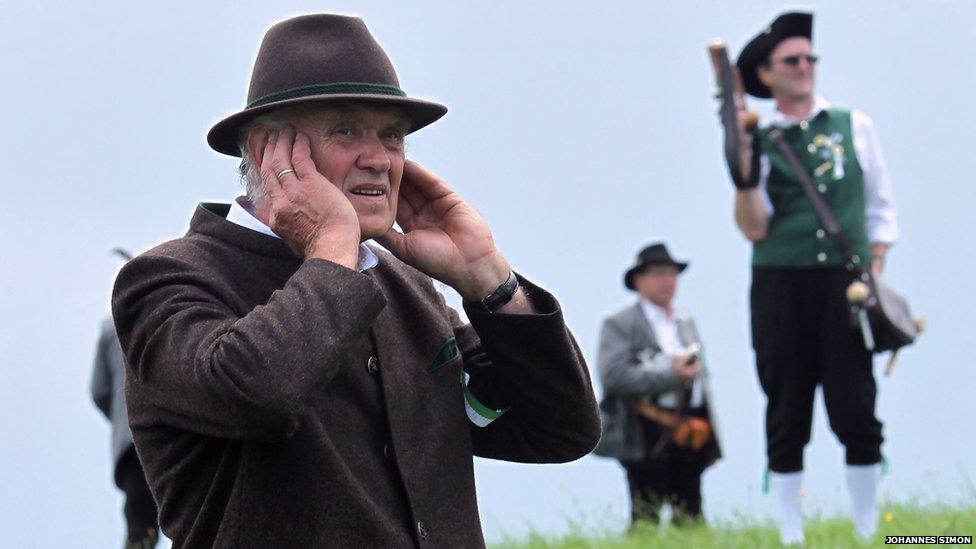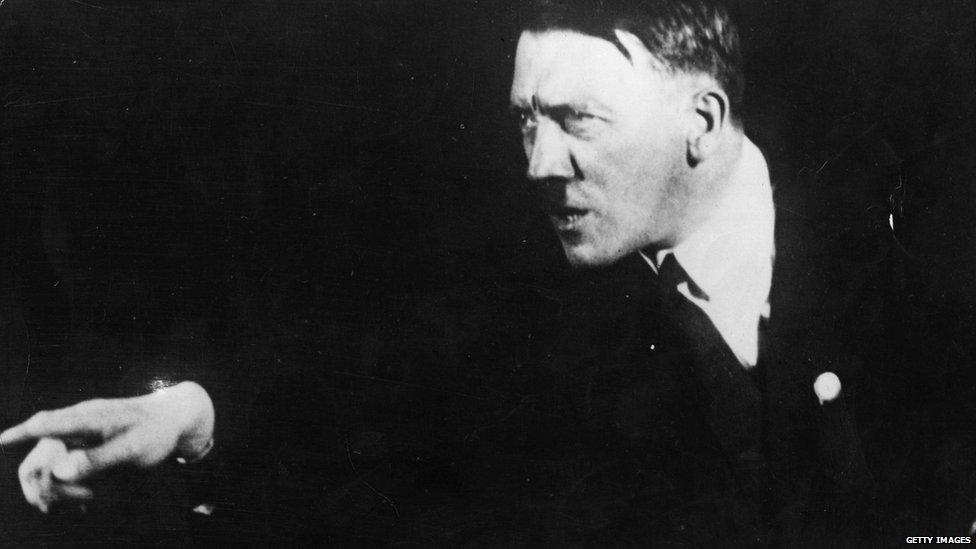How Germany's love of silence led to the first earplug
- Published

Traditional Bavarian boeller gunner protects his ears during the annual boeller feast
Germans have a difficult relationship with noise. They hate it and complain loudly, writes Sean Williams, who has traced Germany's relationship with sound and the invention of the first earplug.
The year 1907 was a pivotal one for German noise.
In Hanover, philosopher Theodore Lessing created the country's first Antilärmverein - anti-noise society - whose members met to debate how the noises of the modern world, from factories and cars to weapons of war, would impinge on the intellectual and cultural world.
"Silence is noble," Lessing frequently told his fellow club members.
Meanwhile, in Berlin's Schöneberg district, pharmacist Max Negwer developed the first modern earplug, which he dubbed Ohropax, a combination of the German for "ear" and Latin for "peace".

Even children, seen here playing in front of a noise barrier, are subject to noise restrictions
Negwer considered the invention a worthy medical aid. But for years he struggled to convince pharmacy owners to stock Ohropax. So he travelled around Germany, selling them to sanitariums and factories that were proliferating in the rapidly industrialising world his contemporary, Lessing, loathed.
The advent of war in 1914 would provide Negwer with a real opportunity to push Ohropax. Hundreds of thousands of deafened soldiers were returning from the front line. In 1917, Ohropax advertised its earplugs as protection "against the sound effects of the cannonade".
Howling dogs
A year later Germany was defeated on the battlefield. By that time Ohropax had carved a dominant place in the market and 10 years later was exporting to 42 countries.
But the Great War - and the world war that followed it, over two decades later - are just one aspect of an attitude to noise and sound that is uniquely Teutonic.
Its effects can be seen up and down modern Germany, from soundproofed parks and highways to powerful anti-noise laws introduced over 40 years ago.
Even Johann Wolfgang von Goethe, the country's eternal poet laureate, tried to stem the intrusion of noise into his life, from preventing a skittle alley being built near his home to despair at the howling of local street dogs.

German poet, dramatist, scientist and court official Johann Wolfgang von Goethe
"Talent develops in quiet places," he once wrote.
Today, Germans are leading the way in creating those places in the chaotic, modern world.
Nauerner Platz in Berlin's Wedding district is not the capital's greenest, grandest or most alluring public space. Set between a main road and a busy metro line, it nevertheless presented a fascinating problem for experts at Berlin's Technical University who, in 2012, wanted to make it a quieter spot for families.
In came devices playing the sounds of running water and birdsong, and a 1.5-metre (4ft) stone-and-plants barrier. Playgrounds and benches were repositioned so as to control the soundscape around the park.
The traffic that passed on all sides could still be heard. But the project dampened it greatly, leaving it quiet enough for families to talk unhindered.
Peaceful playgrounds
Nauener Platz's revamp won that year's European Soundscape Award, administered by the European Environmental Agency (EEA). In fact, German noise-abatement measures are far more manifest than in European neighbours - as anyone who has sped along the autobahn between giant Lärmschutzwände (noise protection walls) can testify.
Germans, it seems, are more sensitive to noise pollution, which the EEA says costs Europe $45bn (£29.5bn) and 61,000 of its citizens' life years annually.
"It has a long history," says Dr. René Weinandy, of the Umweltbundesamt, Germany's leading environmental protection agency.
Germany's 1974 Federal Pollution Act was introduced with the intention of bringing down transport noise across what was then West Germany. It took Britain another 16 years before adopting comparable legislation.
The laws have not stopped Germans from complaining about noise, however. Every Monday in Frankfurt hundreds of people take to the streets in protest at aircraft noise.
In the Rhine Valley, through which freight trains and trucks rumble all the way to Italy, similar protests are also common. Nine out of 10 of all EU railway complaints come from Germany.
Kids' playgrounds across Germany are notable for the lack of noisy children as parents and teachers fear neighbours' reprisals.


Even in Berlin, Germany's "poor but sexy" capital city famed for its party scene, any raucousness is strictly verboten after 22:00. Even a late-night washing machine cycle can result in confrontation.
On Sundays, Ruhezeit ("quiet time") is rolled back to just 20:00, as the country closes down. Shops are shuttered, heavy trucks are banned and electrically assisted gardening is off limits. Courts have even been known to rule on when - and for how long - dogs may bark.
Silence is golden
Culture is at the heart of German attitudes to sound. Since the nature-loving symphonies of Bach and Beethoven, or Goethe, who eulogised the wild and its hunters within, German culture has been interwoven with complex ideas towards quiet.
When synced sound became available to Germany's expressionist film directors in the 1920s, says Lutz Köpnick, of Vanderbilt University, purist directors were vehemently opposed to the "talkies".
"They were very virulent, hesitant to embrace sound, because it ruined the beauty of the cinematic image," he says.
The issue wasn't just that sound would be difficult to synchronise, but that the images themselves, often florid and painterly, would be terminally compromised by the "complication" of sound.
Some even link German's modern-day love of tranquility to Hitler's use of noise to champion his fascist agenda. He subsidised the cost of radio sets to reach inside the homes of each and every German.
Many of his speeches were so shrill they were deliberately deafening, says Köpnick.
"The radio was a key way of filling the airwaves with Hitler's voice, and the Nazis could hold power over people's imagination."

Adolf Hitler used the then new medium of radio to promote Nazi ideology
After World War Two, politicians' speeches became quieter, adopting a more considered tone than their European counterparts.
Ohropax's current factory in the Hessian town of Wehrheim, is not one of Germany's quietest places, buzzing and whirring as thousands of earplugs roll off the production line each day.
Its products, however, have been mitigating noise for over a century. They, like Ohropax's home, have changed throughout the 20th Century.
In 1958, as private enterprise was calcified under East German communism, the company moved to Bad Homburg, near Frankfurt, under the leadership of Negwer's son Wolfgang.
In 1991, with grandson Michael in charge, Ohropax sought a new home. It settled for Wehrhem. The reason? According to Michael: "It had nice peace and quiet."
About the author: Sean Williams is a freelance writer and journalist based in Berlin.